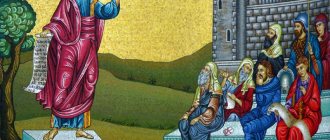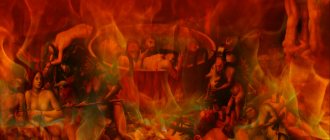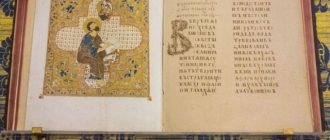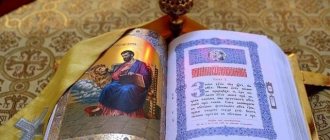The minor fell, the major soared, And the king sings in delight: Hallelujah! (Song from the cartoon "Shrek")
How often can you hear this word today - HALLELUJAH! It is pronounced not only in churches, this word is even used in popular songs, take for example the song Hallelujah from Shrek.
But do ordinary people understand the meaning of this word? The vast majority are not.
Do priests understand the meaning of the word hallelujah? Yesterday I became convinced that some are definitely not.
What did "hallelujah" mean in the Old Testament?
The exclamation “Hallelujah” was actively used in Old Testament services. What does it mean and how is it translated? Hallelujah is Hebrew for “Praise the Lord.” Since the time of King David, this has been the response cry of the praying Jewish people to the singing of psalms during worship.
Originally, the word "Hallelujah" was said by the person who led public prayer. This loud cry served as a call for the people to give praise to God. After this, the worshipers began to sing a hymn of thanksgiving. Gradually, “Hallelujah” was transformed into an independent song of praise by the people gathered for prayer. Over time, this exclamation, along with the exclamations “Amen” (“So be it”) and “Hosanna” (“Lord, save”), becomes an integral part of Old Testament worship.
Orthodox worship
History of the word
Photo: Flickr.com
Despite the fact that all Orthodox prayers have been translated into Russian, two words that remain in the sacred texts to this day have been preserved without translation - “amen” and “hallelujah”.
We recommend reading: What does the word “amen” mean?
The origin of the concept “hallelujah” is associated with the name of the Old Testament god Yahweh. This is a distorted enthusiastic appeal to him in the imperative mood of the plural. In Judea, priests used this word to call people to respond to a prayer text.
In its modern meaning, the essence of the concept has changed somewhat. In Orthodoxy, this is a cry glorifying the Lord, present in many services.
The word "hallelujah" in Christianity
The cry of “Hallelujah” during the singing of psalms passed from Judaism into the prayer tradition of the early Christian Church. Thus, during the service, before reading the Gospel and during Communion, psalms with the refrain “Hallelujah” were supposed to be read. On some holidays, the Church of Jerusalem practiced replacing the reading of the troparions with the singing of “Hallelujah.” Saint Simeon of Thessalonica (14th-15th century) explains the use of exclamation as follows:
“This song - Hallelujah - was spoken by the prophets inspired by the Holy Spirit. It means the coming of God - it means: “God is coming” and “sing to Him,” which is prophetically spoken and sung.”
In addition to the Eucharistic rite of the Byzantine rite, it is necessary to sing “Hallelujah” on some special occasions. For example, during the sacrament of Baptism, when water is anointed with oil. During the consecration of the throne - the table, which is located in the middle of the altar, where the rite of the Eucharist is performed. In the rite of consecration of the antimension, which should be on the throne in the altar. An antimension is a quadrangular board with a particle of the relics of a holy martyr sewn into it. “Hallelujah” is sung during the anointing of them with myrrh, a specially prepared and blessed aromatic oil.
During the reading of kathismas and individual psalms, the doxology “Hallelujah, Hallelujah, Hallelujah, glory to Thee, God” is used. In akathists (praise and thanksgiving chants) after kontakia (except for the first), this refrain is also sung.
Unexpected meeting
Yesterday my wife and I walked past the church, and along the way we talked, if possible, with people about eternal life and its practical possibilities.
And then, like a black cat that usually likes to cross the path of superstitious citizens, a priest crosses our path. (This is what Catholics call a priest).
All in black, a well-fed man of about 30. Well, how could you not talk to this sweet “man of God”?
Since he appeared very suddenly in my field of vision, the question to him was born spontaneously. I asked him:
Conversation with the priest
- Tell me, why are you in all black (I later asked this question to the Orthodox priest)? After all, Christ has risen a long time ago, YOU NEED TO REJOICE, and you are in some kind of mourning clothes?
My question was as much a surprise to him as his appearance in front of me. The answer to such an insidious question was not prepared in advance by him, but the quick mind of this man quickly found a cunning answer:
- Why are your shoes black? Are you in mourning too?
It’s clear that he pulled my boots by the ears here, but I have to give him his due, he didn’t lose his head. And then he said to his own head, as if between words, this “magic word” - hallelujah !
Well, I just couldn’t help but ask him what does hallelujah mean ? In response, he began to invite me to come to his service, and THERE he would tell me everything, introduce me to the living God, and so on.
Our entire conversation lasted only a minute, as the priest was in a hurry somewhere. I only left him a sentence:
- Well, what is hallelujah anyway?
“Rejoice...” he gave me his last word.
Just like that, rejoice, it’s immediately obvious that your comrade doesn’t read dictionaries. But in vain, perhaps, the translation of the word Hallelujah would have made him think a little.
I would not have written this article for the sake of such a momentary opportunity if this morning I had not decided to read about the word hallelujah on the Internet again. And what I accidentally discovered gave me some interesting thoughts.
"Hallelujah" of love
More than thirty years ago, a song with the same name appeared, which became a real anthem of love. At a time when religion was banned, churches were closed, and any mention of God was punished, the cult opera “Juno and Avos,” in which this song sounds, powerfully stirred the minds of ordinary people. This opera tells the story of the love relationship between a handsome Russian nobleman and the daughter of the commandant Conchita. The main thread running through the entire work is the idea that the true love that broke out between the main characters of the opera is under the protection of the Virgin Mary herself.
A true story of eternal love
“Juno” and “Avos” are the names of two sailing ships on which the handsome nobleman Nikolai Ryazanov, the favorite of Catherine the Great herself, sailed. Having dedicated his life to a military career from the age of 14, the stately military man did not come to court and, as a result of intrigue, was sent to the Irkutsk region, where he married the wealthy Anna Shelikhova. However, this marriage was not blessed by Heaven, the count's wife dies young, and Ryazanov is sent to Japan. Then he ends up in Petropavlovsk, and from there he goes to California, where he buys the ships “Junona” and “Avos” with his own money.
Here the 15-year-old daughter of the commandant Conchitta wins the heart of the warrior. Love flares up between them, but a real obstacle arises: Ryazanov was Orthodox, Conchita was a Catholic. The Count goes to Russia to obtain permission to marry, but dies on the way.
Tender Conchita remained faithful to her first love, every morning she went to a stone cape, looked at the ocean and waited for her betrothed, and when she learned about his death, she went to a monastery, where she spent 50 long years. This is the story that gave birth to the rock song “Hallelujah of Love.”
What does the Orthodox cross mean?
I already spoke a little higher about the fact that the Orthodox cross means crucifixion. The curious testimony of the Christian writer Felix Manutius, who allegedly lived in the 3rd century AD, prompted me to return to this issue. Here it is: “As for crosses, we do not revere them at all: we Christians do not need them; It’s you pagans, you for whom wooden idols are sacred, you revere wooden crosses.”
This is called - they have sailed. Did Christians reject the cross? Is the cross a symbol of the so-called pagans? Put this fact in your memory, it is very important.
Below I will quote one paragraph from the epic of the Commissioner of Qatar in full:
“We forget that Jesus died on the cross, but not from the cross, but from the FIFTH blow. First, nails in the hands and feet, and then a stab in the heart with the spear of the centurion Longinus. The spear is the cause of death, and the shed blood is a sacrifice. That is, the described execution of the Savior is a religious sacrifice on the cross. And those who did this needed precisely the blood that would be spilled on the wood of the cross. That is, they wanted to sanctify the flint with blood.”
Who and why arranged the sacrifice of the Savior of the human race, so profound in its symbols? We have yet to answer this question.
How to mark and celebrate Candlemas
If you decide to become closer to the Lord and celebrate in truth, then be positive and let go of all the negativity and grievances that lie in your heart.
On this day the soul must be pure and without evil thoughts. Then you must definitely visit the church and attend the service. If it doesn’t work out, then you can go to a shrine, pray, ask the Lord for forgiveness for your sins and light a candle. Buy a couple of church blessed candles for home. They will help drive away illness and grief, and peace will reign at home.
But here’s what you definitely can’t do on Candlemas:
- engage in heavy physical work (building, sawing, lifting weights);
- wash, wash. clean up;
- wash in the bathhouse;
- use foul language, offend the weak, cry;
- get drunk, have sex.
Most Orthodox Christians gather in a quiet family circle after a church service, so the housewives set the table with a variety of dishes. It is not forbidden to drink a little wine, better than church cahors.
You cannot plan trips on February 15, especially leaving home for a long time on this date.
Great Worship
Liturgy is a mysterious and terrible service that carries within itself elements of eternity. All believers know that during the Eucharist, bread is broken (miraculously changed) into the Body of the Lord, and wine into His Most Pure Blood. Parishioners, reverently taking communion, experience unusually reverent moments that they remember throughout their lives.
The bishop represents Christ, and with his vestments he shows that, just like the Lord, he takes the lost sheep under his protection.
In ancient times, the omophorion was made from white woolen material, the ends of which were decorated with crosses. Later, these ribbons began to be sewn from brocade, silk and other fabrics. The materials were always selected in bright colors for the appropriate services.
The reason for the schism of the church associated with the use of the word
In the Orthodox Church until the 15th century, this word was sung without thinking about what it meant. What “hallelujah” was remained a mystery to everyone. One day a conciliar letter was sent to the metropolitan. The question was how many times “Hallelujah” was supposed to be sung, namely, once or three times. In 1954, Efrosin of Pskov went to Constantinople in order to find out what this word really means and how many times it is necessary to sing it. Upon arrival, he stated that he had received an answer from the Blessed Virgin Mary. According to him, the word had to be spoken once.
In 1551, “Hallelujah” was introduced into singing twice. And in the 17th century, the number of pronunciations of this word increased to three. In all Greek temples they sang exactly the triple (triple) “Hallelujah”. A patriarch from Russia named Nikon did not want to lag behind innovations. He picked up this tradition.
In 1656, Old Believers appeared in Russia who did not accept the tradition introduced by the patriarch. Along with the triple hallelujah, they also considered baptizing with three fingers to be a wrong action.
In 1666, the Great Moscow Council was held. After this event, the special “hallelujah” was finally abolished.
Origin of the word "hallelujah"
Many people pronounce the word “hallelujah” and do not think about its meaning and origin.
This is what people usually say when they manage to solve a problem, overcome difficulties, or avoid danger. “Hallelujah” is said not only by believers, but also by those who are far from religion, but the expression has a religious origin. The word comes from Aramaic. According to the Jewish interpretation, it consists of two parts: “hallelu” and “I.” The first part is translated literally as “praise”, and the second is a contraction of the word “Yahweh”, which is translated as “God”. "Hallelujah" thus means "praise God." Some interpret this term as “give thanks to God,” “great is our God.” The word may have several meanings, but their meaning is the same and it lies in gratitude to God and recognition of his greatness.
The word appears 24 times in the Hebrew Bible and 23 times in the book of Psalms. In the New Testament part of the Bible, “hallelujah” appears only 4 times.
Literature
in Russian
Zheltov M. S., Lozovaya I. E., Efimova N. I., Urzhumtsev P. V. Morning prayers Initial prayers · Rising from sleep · Rising from sleep · Psalm 50 · Nicene-Constantinopolitan Creed · God cleanse · Lord Almighty · We bless you · I sing of grace · Many-merciful and All-merciful · Holy Angel · The Most Holy Lady · Pray to God for me · Song of the Most Holy Theotokos · Troparion to the Cross · Prayer for the living · Prayer for the departed · It is worthy to eat · End of prayers Prayers for the future to sleep Initial prayers · Have mercy us, Lord · Eternal God · Almighty, Word of the Father · Lord, Heavenly King · What will I bring to You · Lord our God · Lord, do not deprive me · Lord Jesus Christ · To You, Most Pure Mother of God · Good Mother of the Good King · Guardian Angel of Christ · To the chosen Voivode · My Hope Father · Master Lover of Mankind · Enlighten my eyes · May God rise · Weaken, forsake · Those who hate and offend · Everyday confession of sins · In Thy hand, O Lord Prayers for Holy Communion Initial prayers · Psalm 22 · Psalm 23 · Psalm 115 · Alleluia · Despise my iniquities · Psalm 50 · Canon for Holy Communion · It is worthy to eat · The Trisagion of Our Father · Have mercy on us, O Lord · Lord, have mercy 40 times · Although eat, O man · Master Lord Jesus Christ · Lord my God, we · One pure and incorruptible Lord · As the Judgment Seat stands before Thy Dreaded and impartial One · Master Lord Jesus Christ our God · With all, Lord · From foul lips · God, weaken · I am not pleased, Master Lord · Prayer 10, St. John Chrysostom · I stand before the doors of Thy temple · I believe, O Lord, and I confess · Behold, I come · Thy Mystical Supper this day · I am horrified by the God-giving Blood · Thou hast made me sweet with love · Lord, Lover of Mankind, Lord Prayers of thanksgiving for Holy Communion Glory to Thee, O God, three times · I thank Thee, O Lord · Master Christ God, King of the ages · Who has given me Thy flesh to eat · Thy Holy Body, O Lord · 5th Prayer to the Most Holy Theotokos · Now you forgive · Trisagion · Our Father · Holy Troparion. St. John Chrysostom · Thou hast received from heaven · Unshameful intercession of Christians · Lord have mercy 12 times · Dismissal Code of regular prayers in the temple Daily liturgical circle · Octoechos · Menaion · Triodion Prayers on different occasions Breviary · Book of prayer chants · Akathist book · Canon · Psalter · Prayers to the saints Types of Prayer Public Prayer · Home Prayer · Personal Prayer · Repentance · Promise · Supplication · Worship · Kiss · Greeting · Gratitude · Doxology · Reading Prayers · Singing Prayers · Mental Prayer · External Prayer · Distracted Prayer · Sinful Prayer · Passionate Prayer · Blasphemous Prayer prayer Category·Portal










